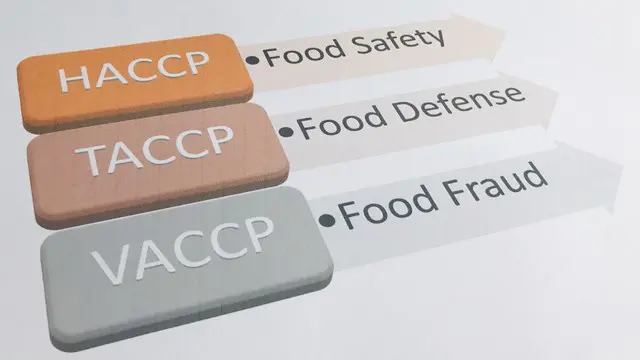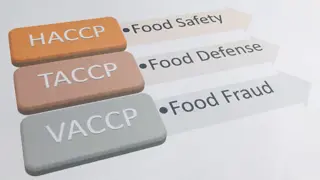
Understanding and Implementing TACCP & VACCP
Expand HACCP plans include Threats and Vulnerabilities
IQMS LEARNING LTD
Summary
- Tutor is available to students
Add to basket or enquire
Overview
This Understanding and Implementing Threat Assessment & Critical Control Points (TACCP) and Vulnerability Assessment & Critical Control Points (VACCP) one day course is based on the requirements of PAS 96:2017 ‘Guide to protecting and defending food and drink from deliberate attack’.
The purpose of PAS 96:2017 is to guide food business managers through approaches and procedures intended to improve the resilience of supply chains to fraud or other forms of attack. These include economically motivated adulteration, malicious contamination, extortion and counterfeiting. It aims to assure the authenticity and safety of food by minimizing the chance of an attack and mitigating the consequences of a successful attack.
This course covers TACCP as a framework which can be applied to assess both threats from ideologically motivated actors (TACCP) or food fraud (vulnerability of raw materials) from economically motivated attacks (VACCP)
Description
Course content
- PAS 96:2017 & TACCP – Terms & Definitions
- The difference between threat and vulnerability assessments
- Introduction to Vulnerability and Threat Assessment Critical Control Point (TACCP)
- How Threat Assessment tools can be used for Vulnerability Assessment
- Conducting a TACCP Study
- Conducting the Threat Assessment
- The different requirements contained within GFSI recognised standards
What are the benefits
Delegates will learn the tools and techniques needed to assess hazards and risks to business, process and product. TACCP provides a process for the identification, evaluation and mitigation of threats that are faced on and off the manufacturer’s site.
Upon successful completion of this course, participants should be able to:
- Understand the difference between HACCP / TACCP / VACCP
- Recognise the different types of threats
- Classify the different types of aggressors
- Develop a TACCP / VACCP system
Who is this course for?
- Senior Management and their representatives
- Technical and Quality Managers
- Those considering implementing a Global Food Safety Initiative (GFSI) approved FSMS in their organisation
- Auditors
- Trainers and Consultants
Questions and answers
Reviews
Currently there are no reviews for this course. Be the first to leave a review.
Legal information
This course is advertised on reed.co.uk by the Course Provider, whose terms and conditions apply. Purchases are made directly from the Course Provider, and as such, content and materials are supplied by the Course Provider directly. Reed is acting as agent and not reseller in relation to this course. Reed's only responsibility is to facilitate your payment for the course. It is your responsibility to review and agree to the Course Provider's terms and conditions and satisfy yourself as to the suitability of the course you intend to purchase. Reed will not have any responsibility for the content of the course and/or associated materials.


